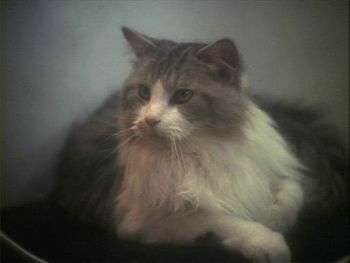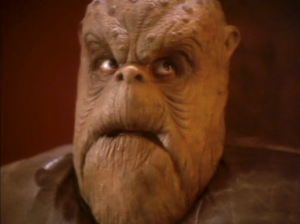 S6E13, “Far Beyond the Stars” (Marc Scott Zicree/Ira Steven Behr & Hans Beimler)
S6E13, “Far Beyond the Stars” (Marc Scott Zicree/Ira Steven Behr & Hans Beimler)
I grouse a lot about holodeck episodes, or episodes that take place on such a weird planet they may as well be holodeck episodes. I’ll do some of this for “Honor Among Thieves” in just a minute, in fact. But it’s not that they are all bad. I just think they generally exist as a way to get to try out a well-worn genre. Maybe it’s a dumb complaint when I expect a SF TV show, which is itself a well-worn genre, not to do a noir detective show or a spy show or whatever. I think it’s mostly just that they tend not to actually have a great story that justifies the remix. If they come up with a good plot that lends itself better to Julian becoming a knock-off James Bond and O’Brien wearing an eyepatch, well then sure. But I think it generally ends up being reverse engineering, like, we wanted to do a spy show, so we spun up a story within that framework. Which naturally means it’s a standard retread of that kind of story. And Boring. “Far Beyond the Stars,” though, might not only be the best out-of-character/genre show ever (though it’s nominally still SF I guess), but it’s probably one of the best of the whole series.
It’s not really a clever idea or plot that makes this one work as much as having excellent production from top to bottom. All the performances are terrific, notably Avery Brooks’ Benny Russell. Avery also directs, and the look of the sets and costumes are amazing, giving the whole thing a warm, rich feel. Rather than the holodeck approach of something like normal pale, weird-looking Data wearing his uniform but with, like, a smoking jacket or whatever, all the regulars are there but different characters, in period costume. The premise is fairly simple: Russell is a writer trying to make a living churning out stories for a typical 1950s SF magazine. But he has to hide his identity, since many readers wouldn’t want to read a black author. He gets enamored with a picture from the art department that depicts DS9, and conjures up a whole series from it (well, the whole series, since he conjures DS9), which includes a black commander. Everyone agrees the stories are winners but the editor says he can’t push for it to be published it unless the commander is changed to a white guy. The injustice is palpable, and the cold truth from the editor is infuriating. He isn’t in a position to fight for its publication (or maybe he doesn’t care). Meanwhile Russell deals with all the other ordinary everyday racist bullshit in his life, including ceaseless harassment from local cops, who eventually shoot and kill his friend Jimmy in the street and beat up Russell for interfering.
I wish this episode was just a dated history, but it obviously isn’t. Life is grossly unfair and stupid as hell, and it still is in lots of ways in 2019. I suppose we can take some solace that we made it from a time when a short story author in a second-tier SF rag wasn’t permitted to be black up to a time when DS9 exists, which does indeed have a black commander, and most of society is perfectly good with that. But it can still be a crime to be driving while black, and our racist garbage president still inexplicably has his job, but the demographics aren’t in his party’s favor anymore. There’s a real path to this episode being irrelevant to the present day in maybe another 20 years. All I can do is hope that’ll be the case.
Ahem. To be less sullen, there’s a lot of fun stuff in this episode too. I loved all the regulars in their human suits. I loved the sunny cafe Cassie worked in, how everyone wore suits and hats or dresses and looked good. I loved that no one had a cell phone and books and magazines and yesterday’s baseball game mattered. There are a million little gags, too. I do have to say that there is no way that Michael Dorn’s hulking Willie Hawkins wouldn’t have been a better baseball player than this guy.
So “Maybe it was all a dream?” is well-documented as the weakest cop-out in human literature, but I somehow felt OK with it this time. It was ambiguous enough, maybe. Or the fact that we’ve established the Prophets will give Sisko these kinds of visions from time to time. Or similar to my general feelings against holodeck stuff, the quality made up for it.
Overall: A great one. 5 out of 5.
S6E14, “One Little Ship” (Bradley Thompson & David Weddle)
This one was silly enough to watch, it’s even sillier to explain it. So they’re studying a “subspace compression anomaly” which shrinks objects as they get closer. Don’t worry! If you go in reverse you’ll go back to normal. OK, sure. But this raises so many questions. What if you beam in close to it, then go out. Do you get huge? What if you travel orthogonally to the compression field? Do only the parts of you that are closer get smaller? What if, as it happens, while you are in the anomaly in a shuttle, and your ship gets taken over by Jem’Hadar, and then you get blown out of the field, so you have to take your mini-shuttle into the ship to help your captive crewmates?
There’s a whole lot of setup here to get us this far, then a whole lot of the Jem’Hadar making them fix the Defiant, but only observing them selectively enough to let them eventually fight off the intruders. Meanwhile the tiny ship is finding its way around the Defiant and I think it’s supposed to be funny. I maybe chuckled politely. In the end they waste an awful lot of time hashing out the intricate rules of how the crew can fix things not too fast to actually help the Jem’Hadar pirates but not so slowly as to arouse suspicion, and shot after shot of the tiny ship punching lift buttons and hiding behind ship infrastructure. They don’t have much left for a resolution (a quick brawl in engineering) or restoring the ship (happens offscreen, take our word for it things went fine).
I did find the internal scuffling between the different Jem’Hadar factions pretty interesting. Now that a number of them have been born in the Alpha Quadrant, a separate culture has emerged. The rift between young and old is now also a rift between Gamma-born and Alpha-born. Could be a future thing of interest. Or I don’t know, confined to Jem’Hadar time-wasting websites. (“Want to feel old? Your First is an Alpha” “Only true Gammas will remember these ways we served the Founders” “9 ways Alphas are killing the ketracel-white Industry” etc.)
Overall: I think you need to find the tiny ship adorable to like this one and not think too much about the anomaly. Nah. 2 out of 5.
S6E15, “Honor Among Thieves” (René Echevarria)
I internally groaned at first because it checked a few lesser-episode boxes for me:
- Flimsy pretense to wedge in a story generally unsuited to Trek (what did I just say, “Honor Among Thieves”?)
- Not that I demand pure SF at all times. Quite the opposite! See literally two episodes ago. DS9 does all kinds of good character stuff, farce, etc. But sometimes, especially in TOS, it uses the vastness of space as good-enough justification for literally any kind of story. Gladiators, cowboys, 20th century regular Janes & Joes, whatever.
- Specifically, gangsters
- And to boot, this felt way to much like “A Piece of the Action“. When I saw “Trials and Tribble-ations” last season I read that they considered that one as their TOS homage but didn’t use it. I guess they didn’t quite get it out of their systems.
- O’Brien Must Suffer
It wasn’t really clear why it had to be O’Brien anyway, other than their hook into the underworld was that O’Brien could slide into Bilby’s life as a handyman. Evidently, still, as always, there is only one fully competent engineer on DS9 that can fix anything. In his absence, every system on the ship starts to decay. They test out some blah excuse that only O’Brien can handle both Federation and Cardassian systems. No, come on. Sisko, please hire some more engineers or start authorizing some refits to swap out the crap Cardassian raktajino makers.
Anyway, my attitude probably didn’t help, but I wasn’t really feeling this one for the first half or so. It was slow and riddled with crime story clichés. Then, gradually, and unexpectedly, it got sad. Poor Bilby drags O’Brien back to his dismal bachelor pad every night to dote on his cat Chester, sigh about his distant family, and bemoan being an old gangster. By the time he gets lured into a high-risk assassination attempt job, O’Brien has built up a cache of sympathy for him so sincere that he turns on his Federation handler and warns Bilby it’s a trap.
I felt like this turn of events was a tough sell. We really don’t know anything about Bilby other than that he has a life of regret. Which, yeah, that’s sad, but the setup here is that he’s a career criminal. He can lovingly feed his Chester every night, but he also injures then kills a guy who cheats him on the Klingon disruptors. The Federation guy reminds O’Brien that Bilby has killed others too, so he shouldn’t be sympathizing with him, and it struck me that our lack of knowledge about Bilby’s past wrecks up the episode’s goals. Assuming he’s got an extensive criminal past, then no, we really shouldn’t be valuing his safety too much. Maybe Bilby has softened up (the guy he killed was another crook, after all?) so jail, rather than death, is the right punishment. But, we don’t really know. It is clear that the Federation takes it too far, which is probably what saves the story in the end. The stated goal of the whole operation is to ferret out a Federation spy, which is accomplished, so they should arrest him at that point. But ick, paperwork, so the icy Federation guy just decides to let the assassination attempt go down, which will neatly dispose of Bilby. (Unlike Bilby’s scant backstory, we do have a whole lot of evidence that Federation bureaucrats are always willing to make a cold decision.) Anyway it ends up not mattering. Bilby is so entrenched in the Orion Syndicate that it’s safer for his family if he just walks into the trap rather than tries to flee. He only asks that O’Brien sees to it that his cat Chester is looked after.
K and I are cat people so I can tell you that this part of the story was unfairly effective on us. I did at one point speculate that Chester was an undercover Changeling keeping an eye on Bilby. But we did see him eat cat food and weren’t sure if Changelings could do that. Which remains unresolved, but anyway, nope, just a cat. O’Brien ends up taking him home, to respect Bilby’s final wishes.
Overall: It ends up being fairly emotional but it’s confusing since we aren’t being told some important backstory. Could they have fleshed that out more, and let Bilby defend himself? Maybe instead of the awkward space prostitute scene? 3 out of 5.
